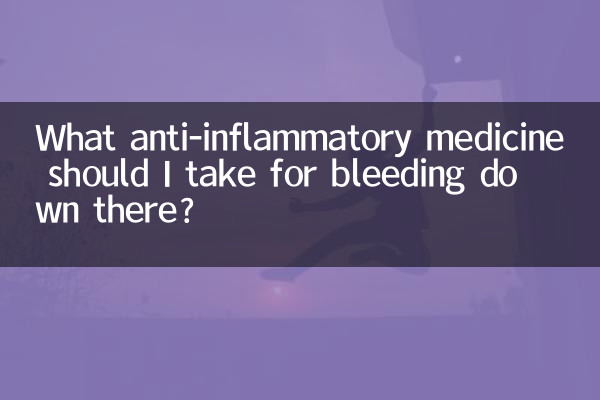What anti-inflammatory drugs should be taken for bleeding: analysis of hot topics on the Internet and practical guide
Recently, the topic of "how to choose anti-inflammatory drugs after bleeding" has triggered extensive discussions on major health forums and social media. This article will combine the hot content of the entire network in the past 10 days to provide you with structured data analysis and practical suggestions.
1. Ranking of popular anti-inflammatory drugs discussed on the entire Internet (last 10 days)

| Drug name | search index | Main applicable scenarios |
|---|---|---|
| amoxicillin | 85,000 | mild wound infection |
| Cefixime | 62,300 | Postoperative infection prevention |
| Ibuprofen | 58,900 | With pain relief needs |
| Levofloxacin | 42,100 | severe infection |
| Yunnan Baiyao | 38,700 | Traumatic bleeding |
2. Guide to selecting anti-inflammatory drugs for different bleeding scenarios
According to recent live popular science content by medical experts, the choice of anti-inflammatory drugs after bleeding needs to be judged based on the specific situation:
| Bleeding type | Recommended medicine | Things to note |
|---|---|---|
| minor cuts | Topical iodophor + oral amoxicillin | Need to confirm that there is no penicillin allergy |
| postoperative bleeding | Cephalosporin antibiotics | The medication cycle needs to be followed as prescribed by the doctor |
| Bleeding gums | metronidazole rinse | Supplement with vitamin C |
| Internal bleeding | seek medical attention immediately | No self-medication |
3. Compilation of recent hot questions and answers
1.Do I need to take anti-inflammatory drugs for menstrual bleeding?
Gynecological experts said that there is no need to take anti-inflammatory drugs during normal menstruation, and only when obvious symptoms of infection appear, medication needs to be taken under the guidance of a doctor.
2.What should I do if my bleeding gets worse after taking anti-inflammatory drugs?
This may be related to adverse drug reactions, especially the interaction between anticoagulants and certain antibiotics. You should stop taking the drug immediately and seek medical advice.
3.How to choose anti-inflammatory drugs for children with traumatic bleeding?
Pediatricians recommend the use of topical disinfectants first, and when oral disinfectants must be taken, special formulations for children should be selected, such as amoxicillin granules.
4. Latest precautions for using anti-inflammatory drugs
1. The issue of antibiotic resistance has aroused widespread concern. Health commissions in many places have issued reminders: Do not use antibiotics unless necessary.
2. The latest adverse reaction monitoring by the State Food and Drug Administration shows that the combination of some anti-inflammatory drugs and analgesics may increase the risk of gastrointestinal bleeding.
3. The Administration of Traditional Chinese Medicine recommends: For minor trauma and bleeding, you can consider using Yunnan Baiyao and other Chinese patent medicines for external application first.
5. Summary of Expert Suggestions
1. You should consult a professional physician whether you need anti-inflammatory drugs after bleeding and avoid making your own judgment.
2. When selecting anti-inflammatory drugs, the cause of bleeding, risk of infection, and individual differences need to be considered.
3. Pay attention to the changes in bleeding during medication. If any abnormality occurs, follow up in time.
4. Completely record the medication, including drug name, dosage and medication time.
5. Special groups (pregnant women, people with liver and kidney dysfunction) need to choose drugs with special caution.
The content of this article combines recent authoritative interpretations and public discussion hot spots in the medical and health field, hoping to provide a reference for rational use of drugs after bleeding. However, it should be noted that the specific medication plan shall be subject to the in-person diagnosis by a licensed physician.

check the details

check the details